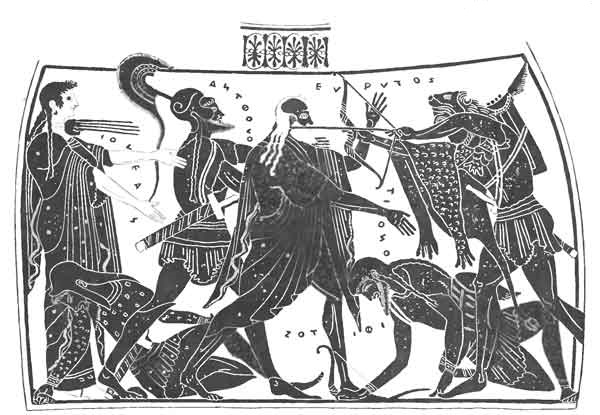AT Trachis Heracles mustered an army of Arcadians, Melians, and Epienemidian Locrians, and marched against Oechalia to revenge himself on King Eurytus, who refused to surrender the princess Iole, fairly won in an archery contest; but he told his allies no more than that Eurytus had been unjustly exacting tribute from the Euboeans. He stormed the city, fiddled Eurytus and his son with arrows and, after burying certain of his comrades who had fallen in the battle, namely Ceyx’s son Hippasus, and Argeius and Melas, sons of Licymnius, pillaged Oechalia and took Iole captive. Rather than yield to Heracles, Iole had allowed him to murder her entire family before her very eyes, and then leaped from the city wall; yet she survived, because her skirts were billowed out by the wind and broke the fall. Now Heracles sent her, with other Oechalian women, to Deianeira at Trachis, while he visited the Euboean headland of Cenaeum. It should be noted here that when taking leave of Deianeira, Heracles had divulged a prophecy: at the end of fifteen months, he was fated either to die, or to spend the remainder of his life in perfect tranquillity. The news had been conveyed to him by the twin doves of the ancient oak oracle at Dodona.
b. It is disputed which city of Oechalia was mentioned on this occasion: whether the Mesennian, the Thessalian, the Euboean, the Trachinian; or the Aetolian. Messenian Oechalia is the most probable of these, since Eurytus’s father Melaneus, King of the Dryopes-skilled archer, and hence called a son of Apollo-came to Mesenne the reign of Perieres, son of Aeolus, who gave him Oechalia as his residence. Oechalia was called after Melaneus’s wife. Here, in a sacred grove, heroic sacrifices to Eurytus, whose bones are preserved in a brazen urn, initiate the Great Goddess’s Mysteries. Others identify Oechalia with Andania, a mile from the cypress-grove, where the Mysteries were formerly held. Eurytus was one of the heroes who the Messenians invited to dwell among them when Epaminondas restored their Peloponnesian patrimony.
***
1. Eurytus had refused to yield Iole on the ground that Heracles used to be a slave. Though Iole’s suicidal leap makes a plausible fable-Mycenaean skirts were bell-shaped, and my father once told a story of a Victorian suicide saved by her vast crinoline-it has most probably been deduced from a Mycenaean picture of the goddess hovering the army as it assaulted her city. The name Oechalia, ‘house of flour’, indicates that the goddess in whose honour the mysteries were held was Demeter.
Comments
Post a Comment